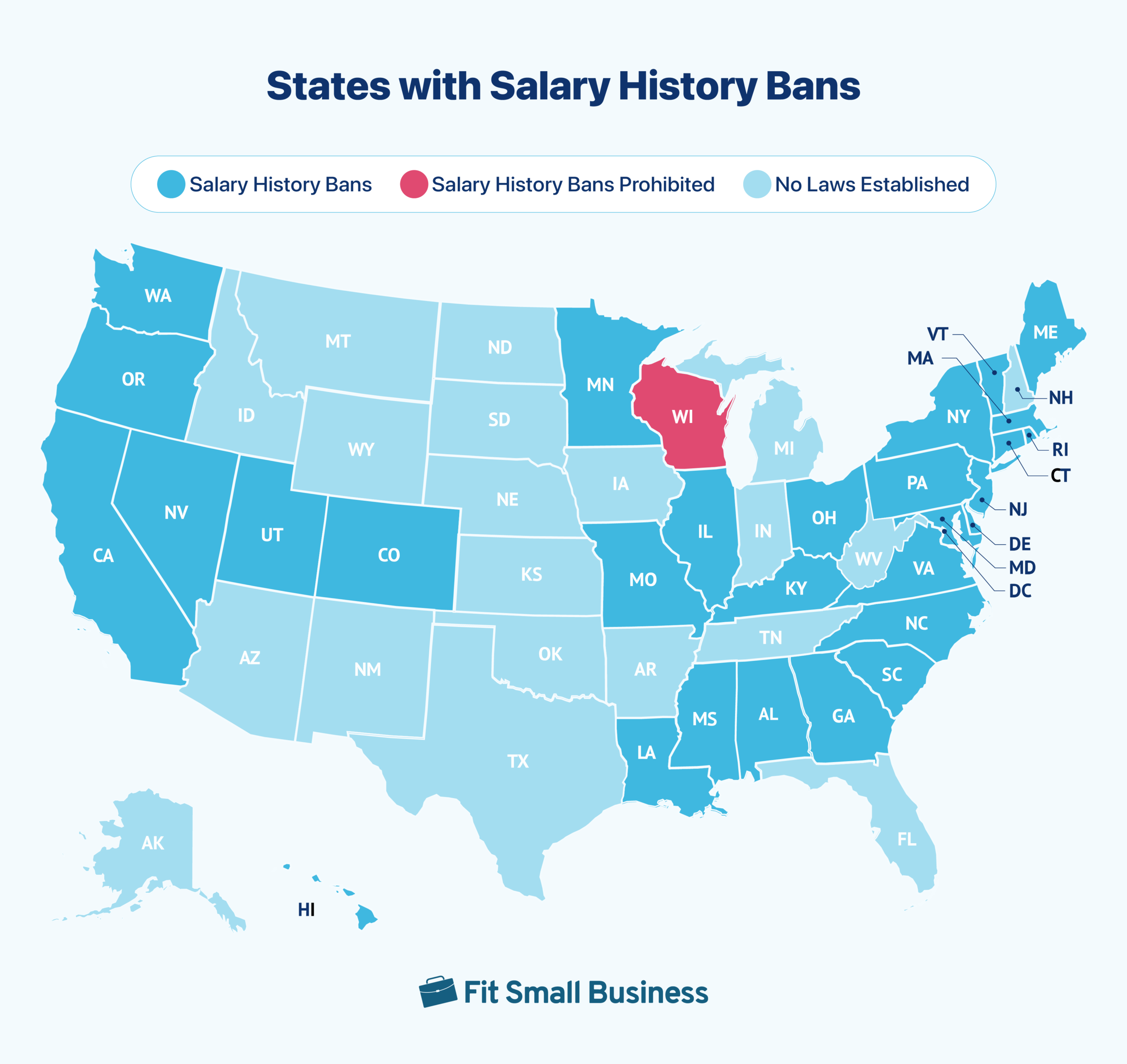Learn how state salary history ban laws can affect the interviewing and hiring process. Check your state and local laws.
Salary History Bans By State: Everything You Need to Know
This article is part of a larger series on Hiring.
A salary history ban prohibits employers from asking job candidates for information about their salary history. While there currently are no federal laws against asking these questions, there are 22 salary history ban states (including D.C.) that have imposed an official forbiddance on asking about salary history.
To comply, some companies are updating job applications and company practices, as each violation can result in a penalty from $100 to over $250,000, depending on the state.
Salary History Ban States & Localities

Currently, there are 22 states with salary history bans (including D.C.) and 23 local salary history bans in place, which may prohibit companies from requesting salary history altogether, prohibit salary history inquiries before providing an offer, or prohibit the use of salary history to set pay.
Explore the tables below for more information on the salary history ban by state and locality.
Laws vary by location. Although Illinois employers are banned from requesting a job applicant’s salary history, for example, they can ask the candidates to describe their ideal salary range for the open position. New York State, on the other hand, bans employers from requesting salary history and asking questions about expected salary ranges.
Two states—Michigan and Wisconsin—originally prohibited bans on salary history altogether. Private employers in these states aren’t allowed to regulate the salary information that employers request from job applicants during the hiring process. However, a new law in Michigan designed to protect the gender gap of females states that State departments and autonomous agencies subject to supervision by the Governor may not inquire about a job applicant’s current or previous salaries unless and until the department or agency first makes a conditional offer of employment, including an explanation of proposed compensation.
How to Comply With Pay History Ban Laws
Complying with salary information bans might seem complicated at first, but once you review your hiring process, policies, and procedures as they pertain to employment laws, it’ll be much easier. The best thing you can do is remove references to your job candidates’ salary history from the application, interview, and job offer processes. Identify each step in the process that leaves your company vulnerable to non-compliance.
Here are ways to ensure your company doesn’t violate a pay history ban:
- Remove salary information requests from all job applications.
- Remove questions about salary from all job interview scripts.
- Don’t ask job candidates’ current or former employers or coworkers about their pay history during reference checks.
- Retrain your human resources and recruiting team.
- Display labor law posters with salary ban regulations in locations where job interviews are usually conducted and that your human resources team frequents.
- Set up a system to document how hourly wage and salary amounts are determined for new employees.
- Review the details of any salary information bans your business must comply with; verify that you’re allowed to ask for salary expectations instead of assuming.
- Review all print or electronic hiring policies and update them to align with your state’s laws.
- Use a job search site to do salary comparisons before finalizing a job offer—check our roundup of the best salary comparison tools for some options. Don’t use any salary history information you receive to determine how much to offer a job candidate.
Avoiding Salary History in Interviews
To avoid asking questions about salary when hiring new employees, focus the job interview questions on the candidate’s ability to perform the job. Get creative and ask case-study questions that will test their thought process on the spot.
It’s also a good idea to inquire about the results your job candidates have had in former jobs. A resume is good at showing an applicant’s previous job titles and duties, but finding out how well they performed may require more digging.
Your goal should be to gather as much evidence as possible to help you determine if the candidates are a good fit for the job. Just because they were once paid $10 an hour for similar work doesn’t mean they shouldn’t be paid the $50,000 a year that their experience is currently worth.
Penalties for Violating Bans on Salary History Questions
Penalties for violating the pay history bans, which can reach upward of $250,000, vary depending on state or local laws. Some states don’t have clear penalties as of yet, and others subject violators to civil penalties, back pay, and even reinstatement of job applicants who were dismissed on illegal grounds (salary history).
Here’s how a couple of the salary history ban laws differ:
- In San Francisco, employers are given a notice and warning for their first violation. They can be charged up to $100 for second violations that occur within 12 months after the first violation, and employers may have to pay up to $500 for any subsequent violations (still within those 12 months.)
- Illinois has a statewide ban and employers have to pay up to $5,000 for each violation. They can be subject to up to $10,000 for “special damages” if the court finds that the employer acted with malicious intent.
Salary History Ban Frequently Asked Questions (FAQs)
Currently, there are no federal laws related to salary history bans. However, a recent White House regulation was proposed to prohibit agencies at the federal level from using prior salary history as a means for setting a new hire’s pay. This could set the stage for a future country-wide salary history ban.
If you have a salary range in mind for a position at your company, you should stick to that range. It is ok to ask a candidate what their ideal salary is (in states where this is allowed), but you shouldn’t base the candidate’s salary on what they made previously. This could lead to underpaying just because the candidate will take less than what you had in mind. This borders on an ethical issue.
As of this writing, it is illegal to ask about salary history in 22 states and 23 localities. The states include Alabama, California, Colorado, Connecticut, Delaware, D.C., Hawaii, Illinois, Maine, Maryland, Massachusetts, Minnesota, Nevada, New Jersey, New York, North Carolina, Oregon, Pennsylvania, Rhode Island, Vermont, Virginia, and Washington.
Bottom Line
Banning companies from asking potential new hires for salary information forces employers to set wages based on other factors. Work experience and credentials should be considered in addition to the market value of your job candidates’ skill sets to ensure you offer new employees fair pay. Also, be careful to research the specific ban that applies to your business to avoid spending thousands of dollars in penalties.


